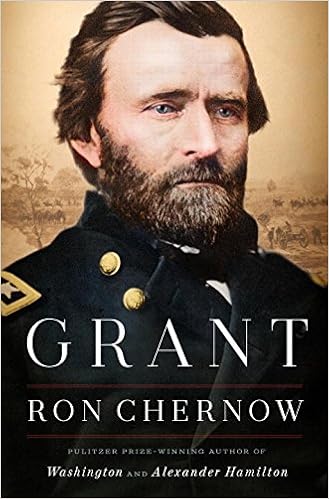. . . I sent the link to Bill Clinton 's review of Ron Chernow's new biography, Grant, to el V.
For the reviews in this post I am providing url instead of a links, as these reviews are behind The NY Times paywall:
https://www.nytimes.com/2017/10/12/books/review/ron-chernow-ulysses-s-grant-biography-bill-clinton.html?
El V's response was dismissive: "It's like Clinton's seeing these ideas of Grant for the first time."
To which I responded, "Clinton is a southerner. When he was growing up, the mainstream, and even scholarly academia hadn't begun to admit and confront that our received history of the Civil War was a falsified, revisionist one. It's even more recently that scholarly academics have begun to view the 20th century accounts of Grant as man, general and POTUS as part of the received revisionist Glorious Lost Cause history, and actively correct it. So yah, it could well be that Clinton is seeing this information of the real Grant for the first time."
El Vaquero thought that made sense and wondered why it hadn't occurred to him while reading B-linton's piece as it did to me.
Over the years I have read many works about Grant as biography, as general, as president, as writer, etc. This includes the books written by his family. And books about and by his closest associates -- friends, family, politicians, soldiers. Still, I am looking forward a great deal to Chernow's Grant, despite having not time to get to it right now. As it's nearly 1000 pages long, it's too big to take along to Mexico, to where we go in a few days for the live Slave Coast performance, academic conference etc. I don't want an e-version since I need the cites and reference pages, as well as the index. Then there are the more than a few reviews that sniff Chernow's book has little or nothing original to say about Grant. But Chernow's an effective word slinger and a conscientious connector of researched historic dots.
Additionally, one does doubt these the reviewers actually have read the whole thing, any more than most of the reviewers of Hillary's book read all her book either (which I have, btw -- it's part of the first draft of this phase of US history, thus essential).
Janet Maslin's New York Times review even claims that Grant is much livelier than Chernow's Hamilton,
https://www.nytimes.com/2017/10/10/books/review-grant-biography-ron-chernow.html
which she complains was "a tough slog." I read Hamilton (2005) back in 2010, and then listened to the audio edition some years later. It seemed to me a quite a felicitous read - listen experience. Like Bill Clinton's review of Grant, Maslin's feels as though she doesn't understand and is unfamiliar with this nineteenth century US history. In the tradition of romperman she pronounces as one encountering this matter for the first time, and therefore believes no one else knows anything about these matters either -- which surely can't be the case for Masilin? Not only does she call the book an attempt at "a make over for Grant," she says it's "startling" to learn that Grant's victory in the War of the Rebellion didn't end southern white supremacy and hatred! It's an odd tone, particularly for a NY Times reviewer to take on a book about what is so central to our national history -- particularly as the NY Times was part of the recent five year, daily, re-examination of the Civil War on the occasion of its sesquicentennial. One suspects that these reviewers now look at another Big US History work, particularly one that deals with the subject matter that makes the US War of Rebellion and that of slavery and white supremacy, and just -- groan, at the very idea of having another one to review, and so barely skimmed it -- as it's clear, after reading it myself, that most reviewers also at best skimmed Hillary's What Happened.
Surely this large, detailed biography of Grant will teach me something I don't already know. In any case, there are many positives to have all this factual and honest information about Grant in a single work by an author that people are ready to believe in, even without the massive hit of the Broadway show of Hamllton made of his bio of that fellow. (Not that they have a lot to do with each other, of course, but it is what we hoped to do with our subjects in Slave Coast.)
The thing is that Grant continues to be vilified with lies constantly. Even in the comments to the reviews of Chernow's book, the trolls howl about Grant owning a slave plantation and loads of slaves and hating black people, being a butcher and a drunk, a terrible general, particularly when compared with that saint, Robert E. Lee. It was refreshing indeed to hear Chernow laugh about that in the WNYC interview with him earlier this week. He said, "Compare for instance, the number of armies that Grant destroyed with those that Lee did. Lee never took out a single army."
Friday, October 13, 2017
Bill Clinton Reviews Ron Chernow's Biography of Ulysses S. Grant
Subscribe to:
Post Comments (Atom)



No comments:
Post a Comment